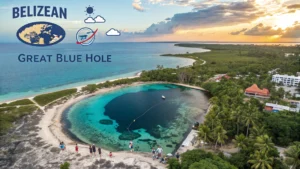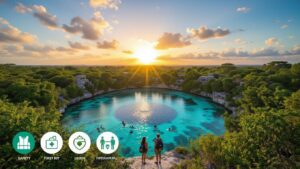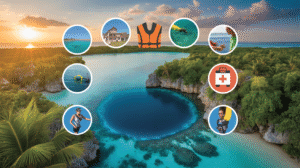Belize is hailed as a top-tier Caribbean destination, making it all the more crucial for prospective visitors to strike a balance between enjoying the heaven that Belize offers and taking essential precautions to protect their safety. This comprehensive guide presents the most recent crime statistics, governmental advisories, and practical insights, empowering travellers to discover Belize’s stunning beaches, lush jungles, and extraordinary ancient ruins while prioritising their safety and security.
1. Comprehensive Examination of Crime Rates and Trends in Belize
As of 2024, Belize reported a homicide rate of 21.7 per 100,000 inhabitants, reflecting a slight increase from the previous year's figure of 21.5. However, a remarkable decrease in homicides by 29 percent was observed in the first half of 2025 when compared to the same period in 2024, with 41 cases reported against 58. According to the CompStat report from the Belize Police Department, overall major crimes also experienced a decline of 9 percent, decreasing from 536 incidents in H1 2024 to 489 in H1 2025. This encouraging trend is attributed to significant reductions in murder (–29 percent), robbery (–15 percent), and theft (–26 percent), indicating improved safety for residents and visitors alike.
| Crime Category | Jan–Jun 2024 | Jan–Jun 2025 | Change |
|---|---|---|---|
| Major crimes | 536 | 489 | –9 percent |
| Murders | 58 | 41 | –29 percent |
| Robbery | – | – | –15 percent |
| Theft | – | – | –26 percent |
2. Essential Government Travel Advisories for a Safe Journey to Belize
- U.S. Department of State: Currently, Belize is classified as Level 2: Exercise Increased Caution due to the high incidence of violent crime, which includes sexual assault, home invasions, armed robberies, and murder. Specifically, the Southside of Belize City is designated as Level 3: Reconsider Travel, advising avoidance of non-tourist areas south of Haulover Creek. Source: U.S. Department of State
- Government of Canada: Canadians are encouraged to exercise a high degree of caution throughout the nation, with strong advisories to avoid non-essential travel to Southside Belize City due to ongoing gang and drug-related violence. Source: Government of Canada
- UK FCDO: The UK Foreign, Commonwealth & Development Office warns that Belize has one of the highest murder rates globally per capita; gang-related violence primarily affects the Southside of Belize City. Conversely, areas such as San Pedro, Caye Caulker, Placencia, and San Ignacio generally remain safe for travellers who exercise necessary caution. Source: UK Foreign, Commonwealth & Development Office
3. Identifying High-Risk Areas and Common Criminal Activities in Belize
- Belize City (Southside): This area is notorious for gang activities, significantly contributing to elevated rates of violent crime. It is wise to steer clear of non-tourist neighbourhoods, particularly after dark, in order to ensure personal safety.
- Border Zones: Regions adjacent to the borders are currently facing increased smuggling and cross-border violence, particularly with Guatemala. Travellers should approach these areas with caution and awareness.
- Petty Crime Hotspots: Locations such as San Pedro have reported incidents of pickpocketing and credit card fraud. It is advisable to remain vigilant by concealing your PIN when using ATMs and to prefer machines located inside banking institutions for enhanced security.
4. Effective Safety Strategies for Travellers Exploring Belize
Boosting Your Personal Security During Your Travels
- Maintain vigilance: It is essential to avoid walking alone at night, particularly in urban areas such as Belize City and Belmopan, where the risk of crime is notably higher.
- Secure your valuables: Always utilize hotel safes for your important belongings, and keep wallets and mobile phones out of sight to deter potential thieves.
- Be wary of spiked drinks: Never accept food or beverages from strangers, as this may lead to dangerous situations that jeopardise your safety.

Transportation Safety Guidelines for Travellers
- Road Conditions: It is important to note that most secondary roads in Belize are unpaved and poorly lit. It is advisable to travel during daylight hours only and to ensure that your fuel tank is always adequately filled before embarking on longer journeys.
- Public Transport Caution: Public buses often lack proper maintenance—it's best to avoid them when possible. When using licensed taxis, remember that they are not regulated by meters; therefore, it is wise to negotiate your fare beforehand to prevent any misunderstandings.
- Ferries Safety: When travelling between the cayes, ensure that life jackets are readily available and that vessels are not overcrowded to guarantee safe passage.
Engaging in Adventure Activities with Safety in Mind
- When participating in adventure activities such as scuba diving, zip-lining, and cave tubing, always choose reputable operators. Verify their safety records and equipment standards to ensure your well-being; consider obtaining travel insurance that covers medical evacuation for added peace of mind.
- Only swim in designated areas; riptides are common, and lifeguards are often unavailable, making it crucial to prioritise safety while in the water.
Important Health Precautions for Travellers Visiting Belize
- Vaccination Recommendations: Although there is no entry requirement for yellow fever, it is strongly advised to get vaccinated against hepatitis A, hepatitis B, typhoid, and rabies before travelling to Belize. For comprehensive details, refer to the CDC guidelines.
- Mosquito Protection: Given the year-round risk of diseases such as dengue, chikungunya, and Zika, it is vital to use EPA-approved insect repellent, wear long-sleeved clothing, and sleep under mosquito nets to minimise exposure to these pests.
- Water Safety Guidelines: Adhere to the principle of “boil it, cook it, peel it, or leave it” regarding food and water consumption. Carry oral rehydration salts to effectively manage traveller’s diarrhoea and ensure adequate hydration while in Belize.
5. Key Considerations for Women, Children, and LGBTQ+ Travellers
- Women travelling solo should exercise heightened caution to avoid isolated areas and poorly lit alleys, as there have been reports of harassment in certain regions, which can be concerning.
- Members of the LGBTQ+ community may face social stigma in Belize; it is advisable to refrain from public displays of affection to ensure personal safety and comfort during your visit.
- Children travelling alone or with only one parent are required to possess notarised parental consent letters, as immigration officials in Belize strictly enforce this regulation to prevent child abduction.

6. Accessing Emergency Services and Consular Support in Belize
- In emergencies, always dial 911 for immediate assistance, whether for medical, fire, or police services while in Belize.
- The U.S. Embassy located in Belmopan and the Canadian Honorary Consul in Belize City can provide assistance with issues such as arrests, detention, or other emergencies. For further information, visit U.S. Embassy Belmopan.
- Be sure to register in your government’s traveller-registration programme, such as STEP for U.S. citizens or the Registration of Canadians Abroad for Canadians, to stay informed and receive any necessary assistance during your stay.
Thorough Bibliography for Empowered Travellers
- Belize Police Department’s CompStat report
- U.S. Department of State Belize Travel Advisory
- Government of Canada Travel Advice for Belize
- UK Foreign, Commonwealth & Development Office Advice
- CDC Traveller’s Health: Belize
- U.S. Embassy Belmopan
The Article Is Belize Safe to Visit? 2025 Complete Safety Guide for Smart Travelers appeared first on Belize Travel Guide
The Article Belize Safety Guide 2025: Essential Tips for Smart Travelers Was Found On https://limitsofstrategy.com
The Article Belize Safety Guide: Key Tips for Savvy Travellers 2025 found first on https://electroquench.com


